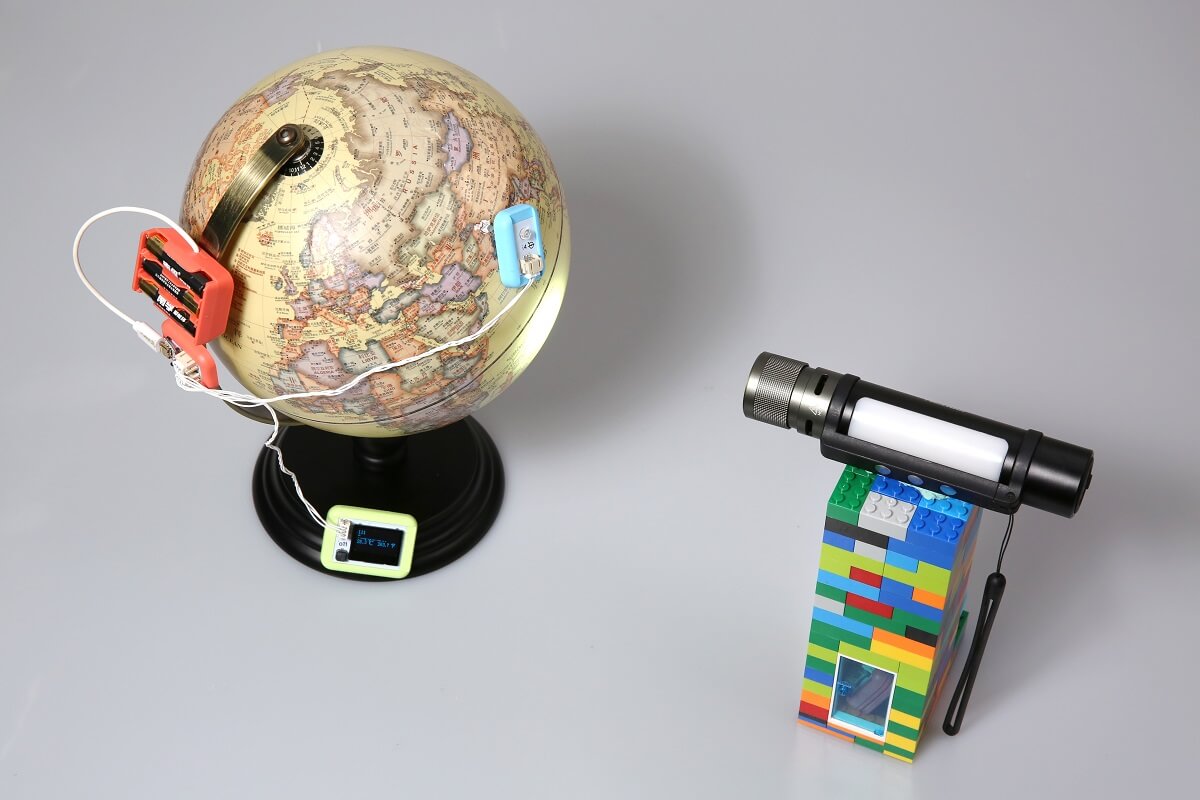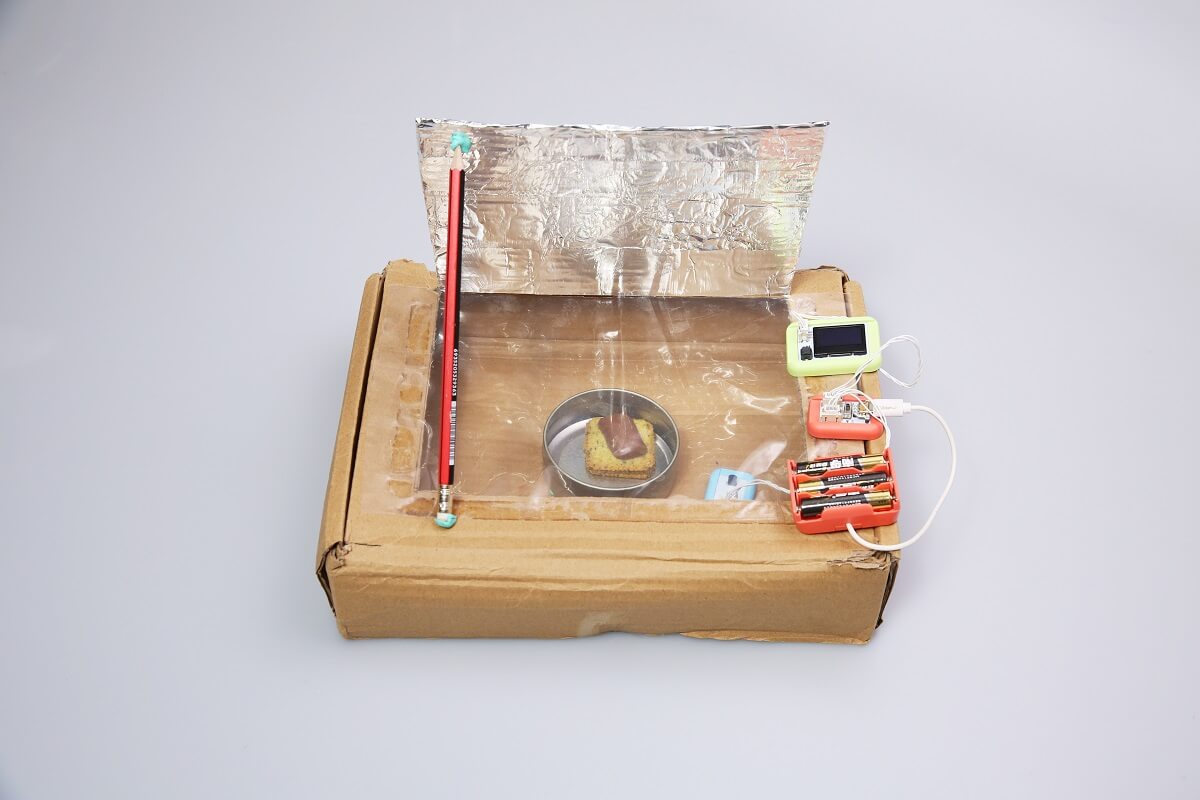
1. Introduction
Boson Science Design Kit, aimed at 8~10 years old kids, combines physical science and engineering design knowledge in one kit. The carefully designed 7 scientific experiments and 5 engineering projects would let students learn scientific principles in practice by applying BOSON modules into actual applications.
During the engineering project design, students will be asked to use BOSON light, sound, and motion modules to make creative projects like “fridge door-closing reminders”, “solar oven” and so on. In scientific experiments, they will get to know some physical sciences, for instance, use BOSON temperature sensor to explore “how to make your living room comfortable?” so as to understand the principle of energy transfer.


Features
- Supports sound, light and motion interaction.
- Contents: Engineering design and Physical Science.
- Coding free, simple and easy-to-use.
Specification
- Package dimension: 60 x 220 x 300 (mm)
- Weight:990g
2. Introduction to Teaching Contents and Projects
The carefully-designed 7 scientific experiments and 5 engineering projects would let
students learn scientific principles in practice by applying BOSON modules into actual
applications.
Refer to NGSS curriculum standard, the course catalog and field distribution are shown below:

2.1 Project Introduction
| Project |
Project Description |
 |
Observe a phenomenon in daily life, explore the question---"Why are electrical wire covered in plastic?” to lead
out the concept of conductivity, and help students get to know conductor and insulator by experimenting so as
to understand the principle of electrical wire and learn the electrical safety basics. |
 |
Introduce the light of reflection principle to students starting from the question “Why does the Moon shine at night?”,
then lead them to observe the phenomenon of light reflection by experimenting to recognize the nature of light. |
 |
In this lesson,we will mainly explore the thermal insulation performance of wood, plastic, and metal so as to introduce
the concept of heat, leading students to find out which kind of material has better thermal insulating performance as
well as get to know the basics about heat transfer. |
 |
In this lesson, starting with this common phenomenon, we are going to test whether a sun shield is effective in shading
and insulating the heat from the sun, and review the knowledge about heat transformation. Then, we are going to study
which of the three materials, aluminum foil, corrugated paper and black EVA sponge paper, is more suitable for making
sun shields for cars, so that we can learn the energy transformation process and the knowledge of thermal radiation |
 |
This lesson will mainly focus on seasonal alternation, discussing the question "why is spring followed by summer, not
winter?". It will lead students to construct a simple "earth-sun" model to explore the distribution of sunlight on the earth,
study the direct and oblique light knowledge, and learn the revolution of the earth and the formation of the four seasons. |
 |
This lesson focuses on talking about the question“why do very few plants grow in deserts”, and leading students to find
out the difference between sand and soil. It aims to help students explore the difference in water storage capacity between
sand and soil through experiments, and understand that water in the soil is stored in soil pores through capillarity. |
 |
This lesson will lead students to think about the question "where does the rainwater come from and where does it go?",
observe the movement of water droplets on the glass of ice water. By using soil, water and plastic box to build a simple
water cycle model, they will explore the formation process of the water cycle, learn the three forms of water and the
distribution of water on the earth, and understand the dynamic process of the water cycle and what role water cycle
plays in the lithosphere, biosphere, hydrosphere and atmosphere. |
 |
We all love barbecues, but smoke produced by grilling often contains pollutants that damage health. Can we utilize
pollution-free solar energy to cook food? In this lesson, we are going to make a solar oven to cook chocolate sandwich
biscuit based on the principle of light reflection. |
 |
This lesson will lead students to explore how to make a fridge door-closing reminder, and determine the proper
height the temperature sensor should be positioned at based on the principle of hot air rising and cold air falling. |
 |
In this lesson, students will discuss how to solve the problem of lack of sunlight in a greenhouse in winter or rainy days,
and try making an automatic light fill device to help plants grow better! |
 |
This lesson will begin with the question “Why towels can absorb water” to lead students to discuss and get to know
the capillarity action of water. They will be asked to make an automatic watering device based on the capillarity action
principle, and explore how to improve the watering efficiency by enhancing the capillarity or reducing water evaporation. |
 |
Taking "Burglar Alarm" as an open subject, the last project in this set of lessons guides students to complete engineering
design tasks according to the NGSS standard steps. Just like engineers, students will find problems, set goals,
design plans, build and test models, optimize and improve models, and finally complete the whole project. |
3.Documents
Click to view online tutorial: DFRobot Science Lab Season 2
Click to download the tutorial:BOSON Science Design Kit Tutorial.pdf
Product pictures:
4.Product List
- Click on name to enter product wiki webpage
|
|
|
|
|
|
 |
 |
 |
 |
| BOS0002-Y Yellow Push Button *1 |
[BOS0038 Soil Moisture Sensor][1]*1 |
[BOS0004 Light Sensor][2] *1 |
BOS0021 Fan Module *1 |
[BOS0011 Temperature Sensor][3] *1 |
 |
 |
 |
 |
 |
| [BOS0020 Buzzer Module][4] *1 |
[BOS0016 Ultra-Bright LED][5] *1 |
[BOS0029 Logic Module NOT][6] *1 |
[BOS0027 Logic Module AND][7] *1 |
[BOS0028 Logic Module OR][8] *1 |
 |
 |
 |
 |
 |
| [BOS0032 Threshold Module][9] *1 |
[BOS0044 Display Module][10] *1 |
[BOS0036 Mainboard-1IO][11] *1 |
FIT0529 Boson:3xAAA Battery Holder |
[BOS0012 Conductivity Switch][12] *1 |
 |
others |
|
|
|
| Alligator Clip Test Cables (white and yellow) *2 |
Boson Micro USB cable *1
5cm Sensor Cable *5
10cm Sensor Cable *10
20cm Sensor Cable *5
FIT0526 Boson:Velcro Pack *1
FIT0527 Boson:Screws Pack *1 |
|
|
|
The picture is only for reference, please make the object as the standard.
More about BOSON
Boson STEM Education
Boson Kit Product List
FAQ
For any questions, advice or cool ideas to share, please visit the DFRobot Forum.






























